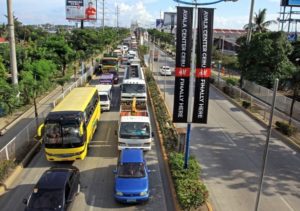
Traffic in U.N. Avenue leading to the Marcelo Fernan Bridge is often congested. But urban planners say the tri-level flyover project of the Department of Public Works and Highways (DPWH) will not solve traffic congestion.
CDN FILE PHOTO
“Not another flyover project.”
This was the call of two urban planners and an organization advocating for sustainable solutions to issues, such as traffic congestion, which plague a growing metropolis like Cebu.
Architect Joy Martinez Onozawa described the tri-level pass project on U.N. Avenue as a “wrong approach” and will not solve Cebu’s traffic congestion problem.
“What we need is a road network plan. Check our map … we have so many dead ends. Everyone is passing on one road. We need to open up those smaller roads, cut the dead ends and make them into through roads,” said Onozawa, an active member of the Metro Cebu Development and Coordinating Board (MCDCB).
The P947-million tri-level pass project on U.N. Avenue has already been awarded by the Department of Public Works and Highways (DPWH) to a winning bidder.
The tri-level pass project — which consists of a flyover, tunnel and road — is expected to start construction within the year, according to DPWH-7 maintenance officer Faustino dela Cruz during a January 9 meeting with members of the Mactan Bridge Management Board held at the Capitol.
Urban planner Yumi Espina said the intersection of U.N. Avenue and Plaridel Street is a crucial junction that should not be subjected to more traffic disturbance especially that there are only two bridges going to Mactan and the new airport terminal will open soon.
“We need to wait for the third bridge to operate before we can work on their plan. (In the) meantime, less disruptive options can be explored and implemented like traffic management, flared intersections or even extension of that coastal road through the SMC (San Miguel Corporation) port for a parallel route to the north,” said Espina.
Rudy Alix, convenor of the Movement for a Livable Cebu (MLC), said projects like the tri-level pass have massive cost and impact and will need to go through a proper process.
“We need to make sure that investments using hard-earned public money do not get squandered in useless projects that do not properly address the true needs of the people,” he said.
“We all need to remember that the money for these projects come from us, the tax-paying public. We, the sovereign people, have the natural and legal right to participate in the decision-making process, and demand that the process mandated by our laws be followed,” added Alix.
Onozawa, who was one of the vocal personalities in stopping the construction of the Gorordo flyover in 2011, said the public needs to know why projects like the tri-level pass should be properly consulted and discussed.
Onozawa along with business leaders, urban planners and architects, religious communities and private individuals formed the Stop Cebu Flyovers Movement, which later became the MLC.
“In the past flyover issue, we went to Manila. Our names were there. .. that we approved the flyover when in fact we vehemently opposed the construction of flyovers. The DPWH report said that we supported it,” said Onozawa.
She said they had an audience with then DPWH Secretary Rogelio Singon to tell him about their concerns.
She called on the public to be vigilant and speak out because the tri-level pass is “not a project of the DPWH but a project of the people.”
“We are not bow under a dictatorship. We are in a democracy. This is up to the people. This project should have proper consultation and should involve planners and architects,” said Onozawa.
MLC emphasized that the requirements of the Local Government Code be complied with and that stakeholders and other concerned organizations, especially MCDCB and other affected sectors, should be consulted prior to starting any project of this magnitude.

